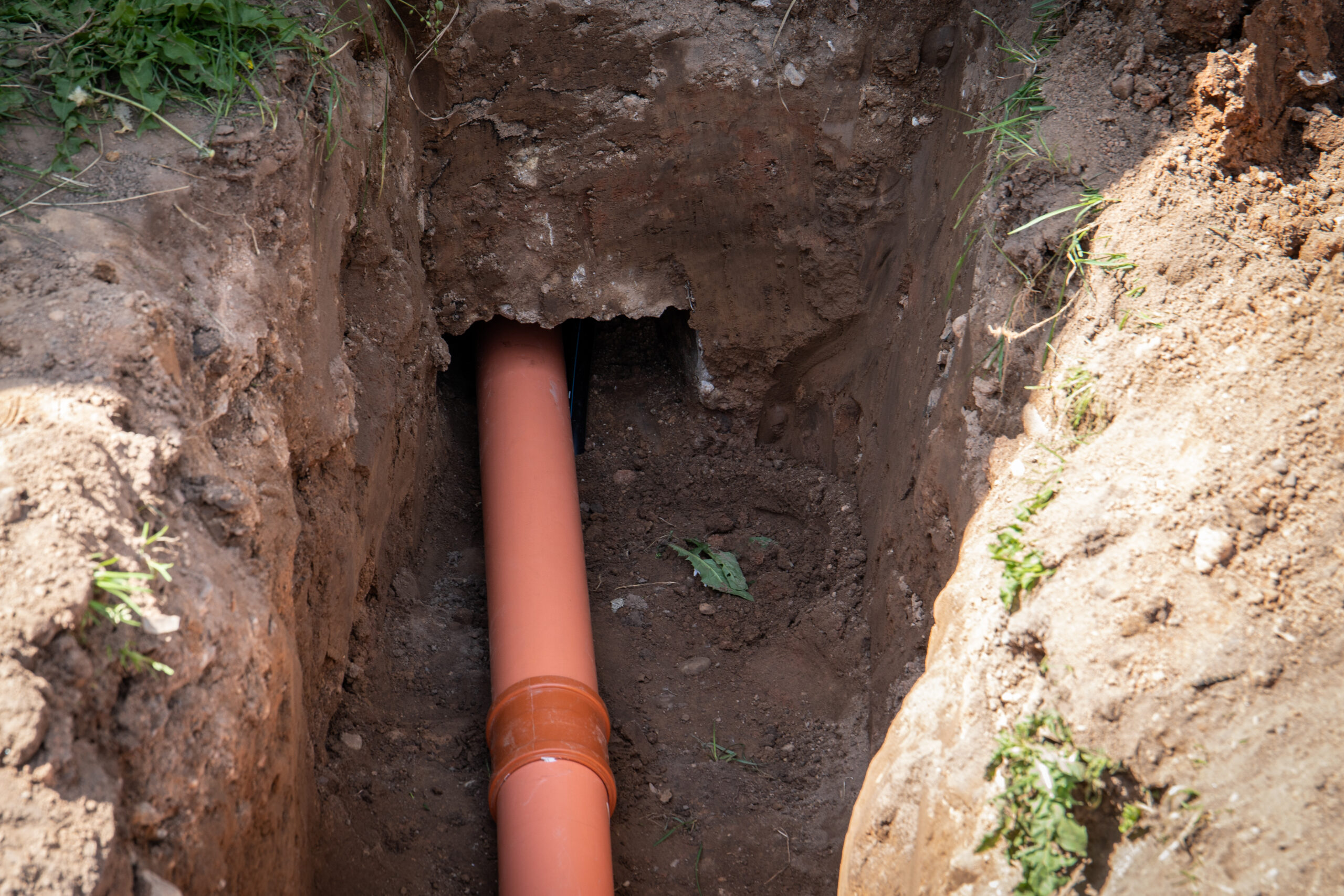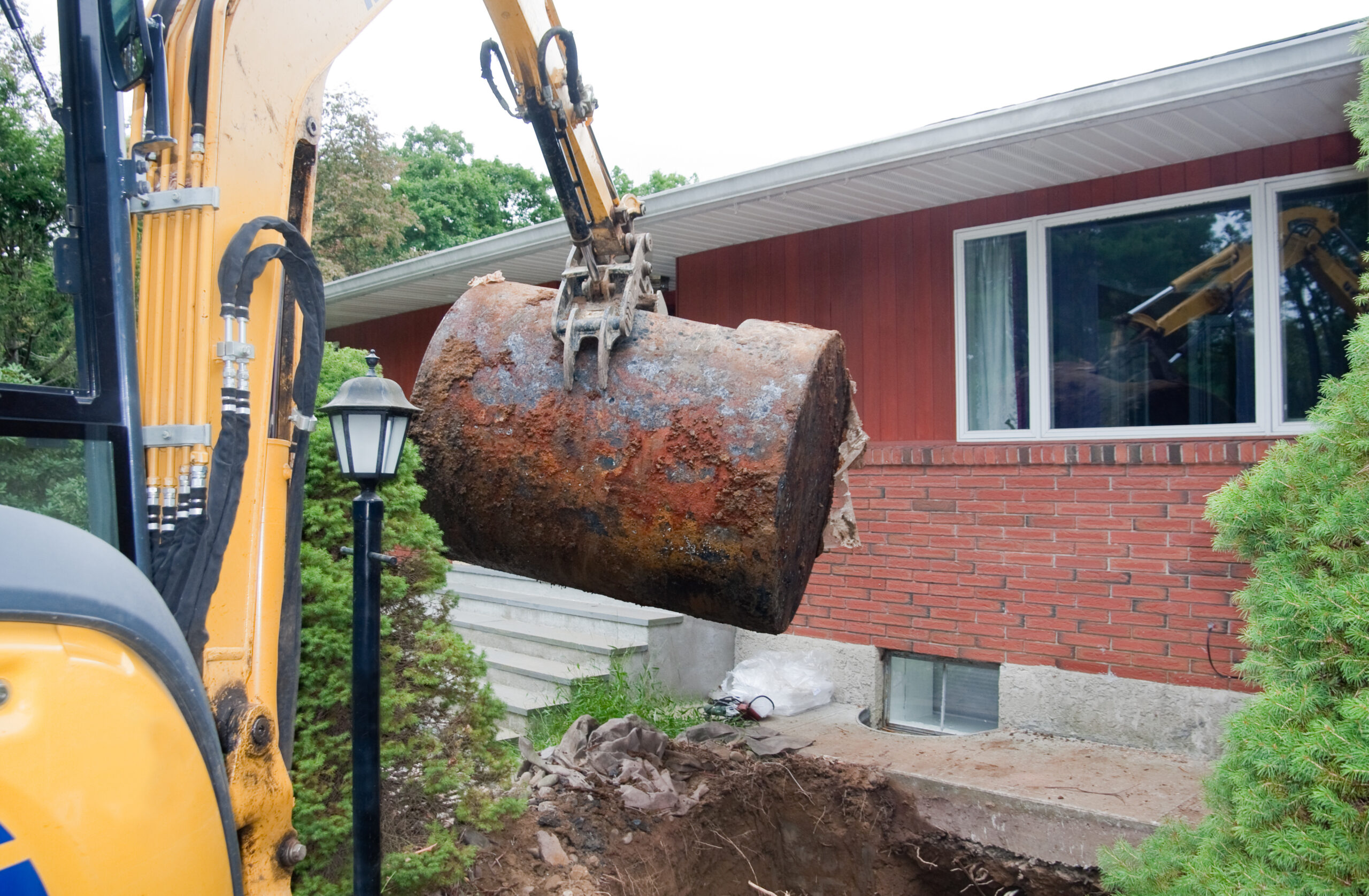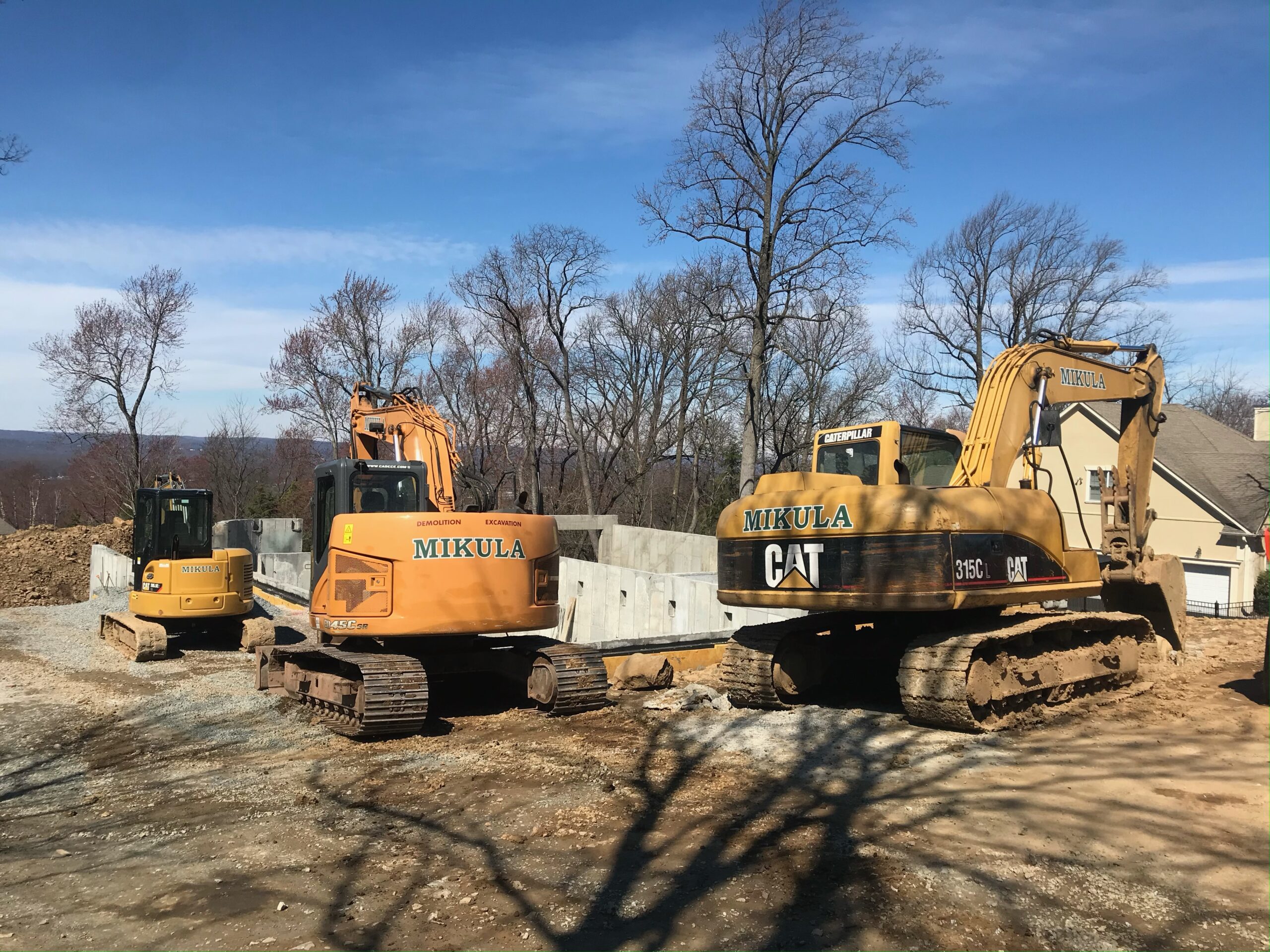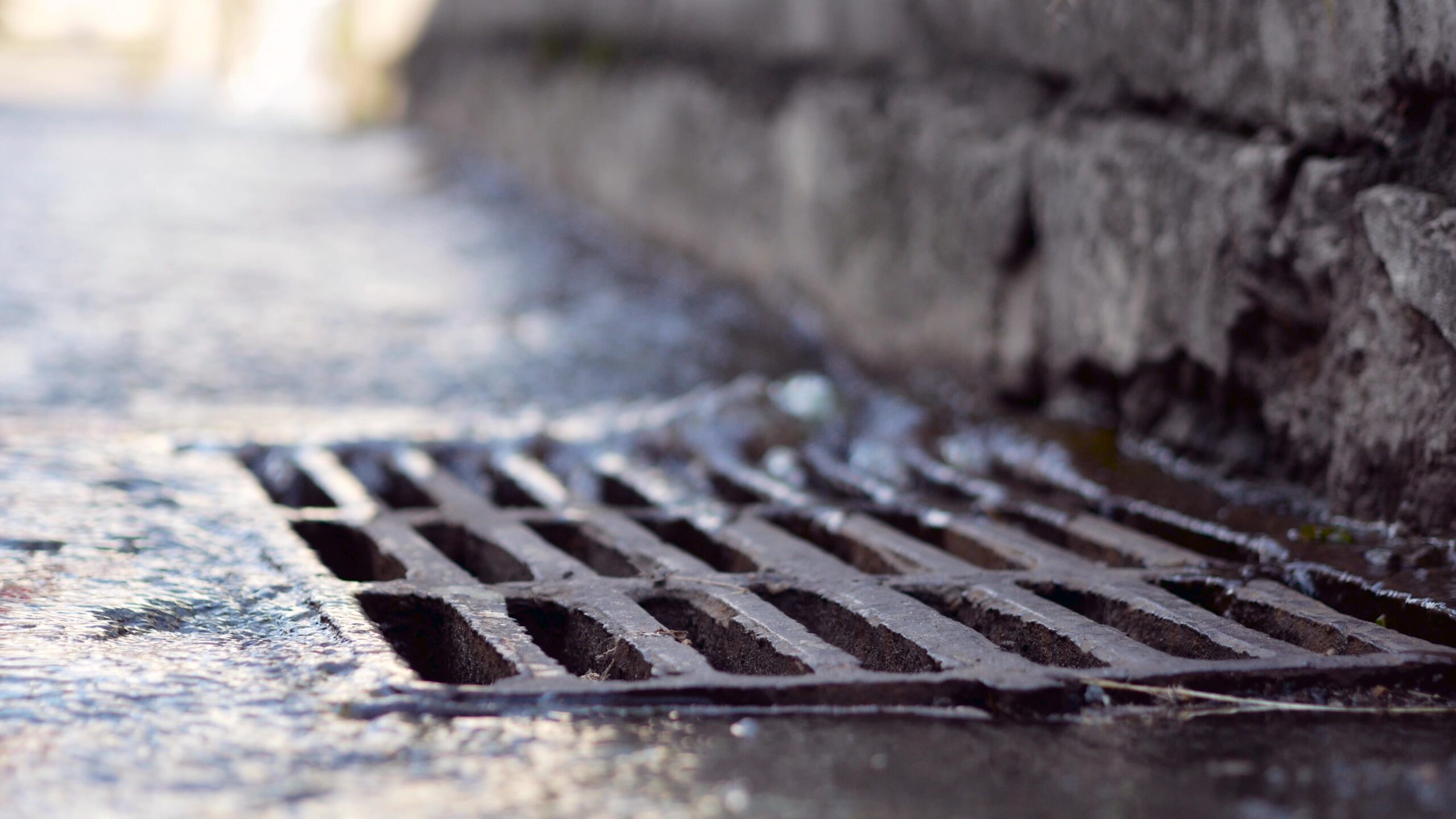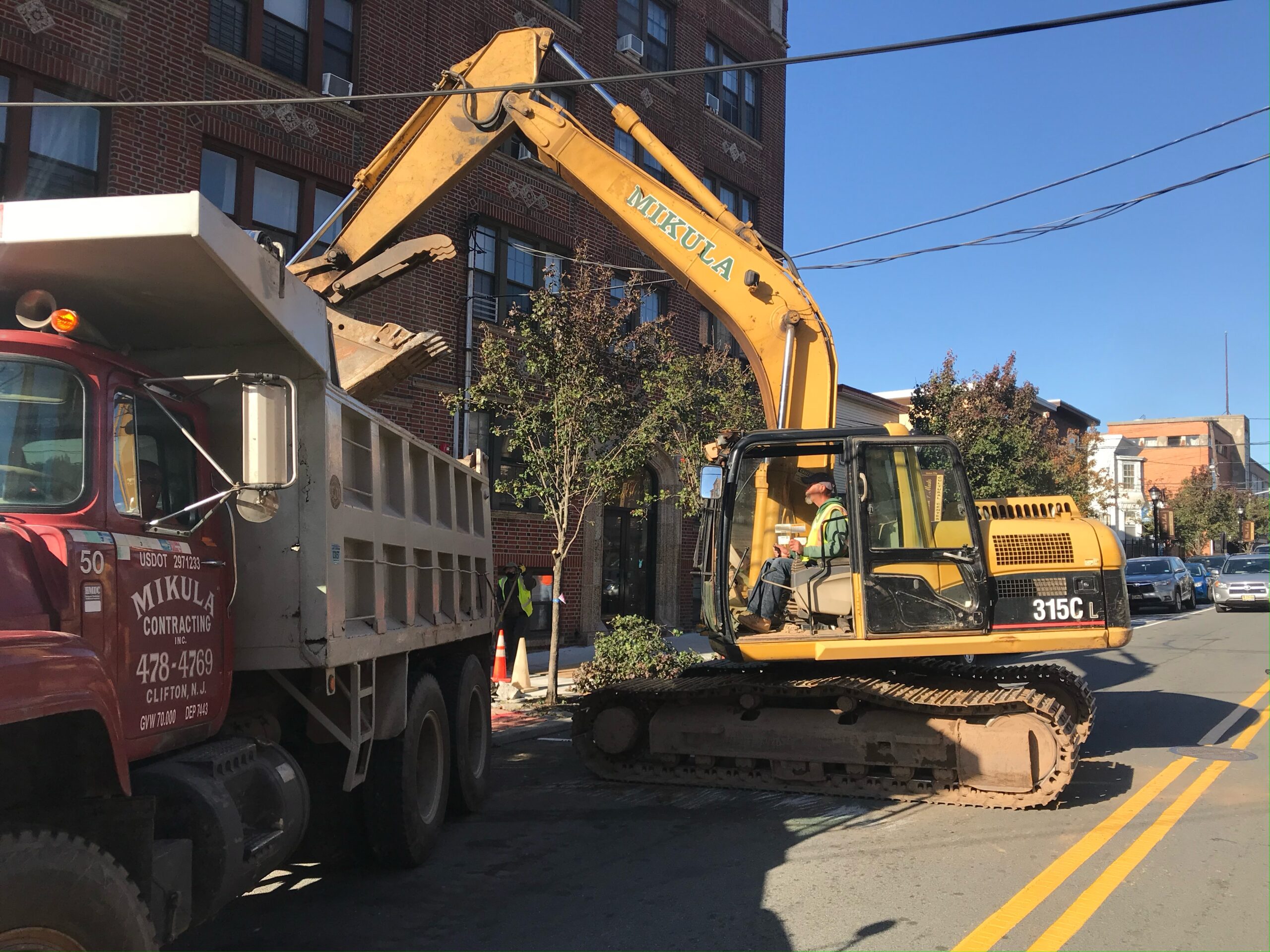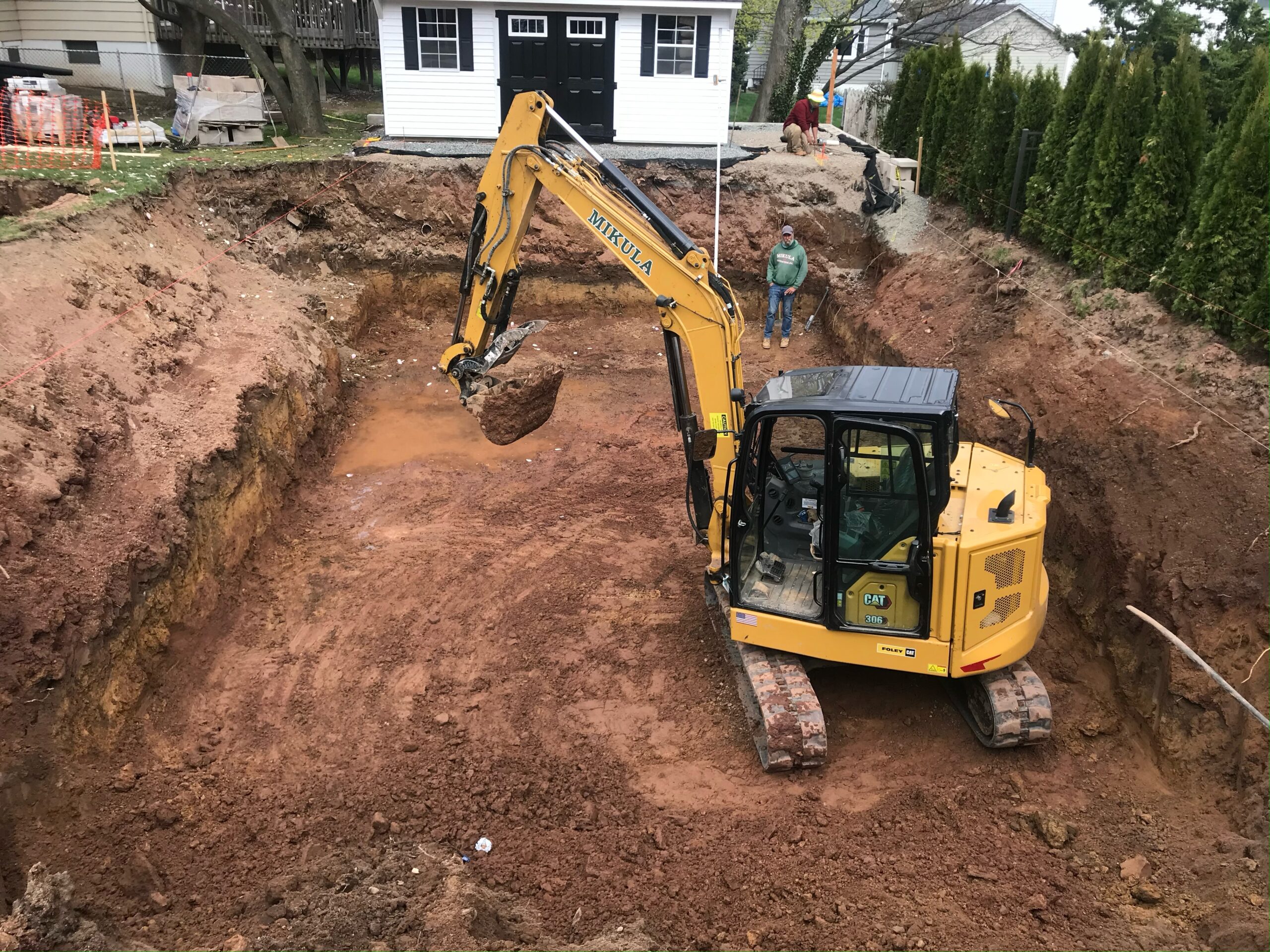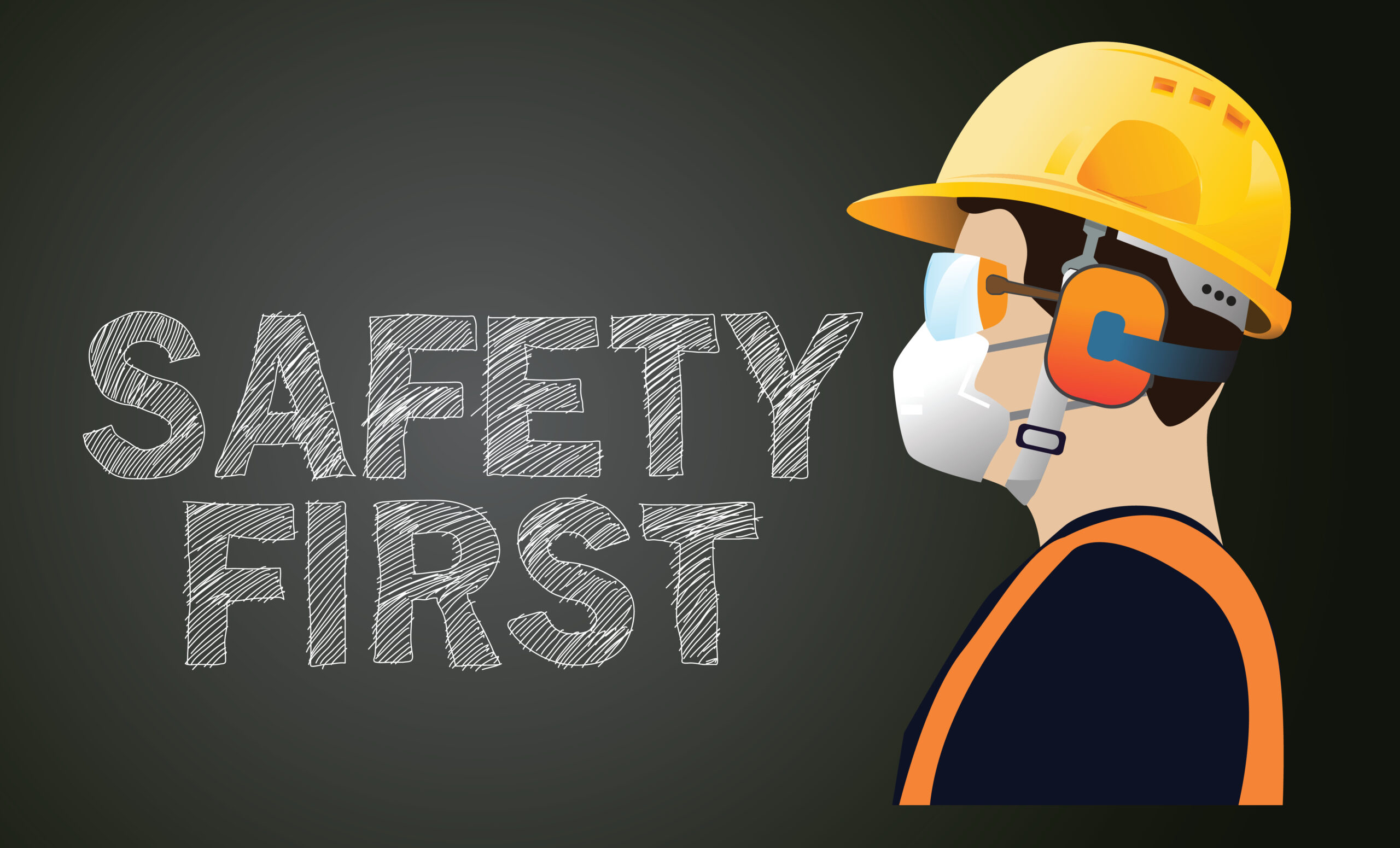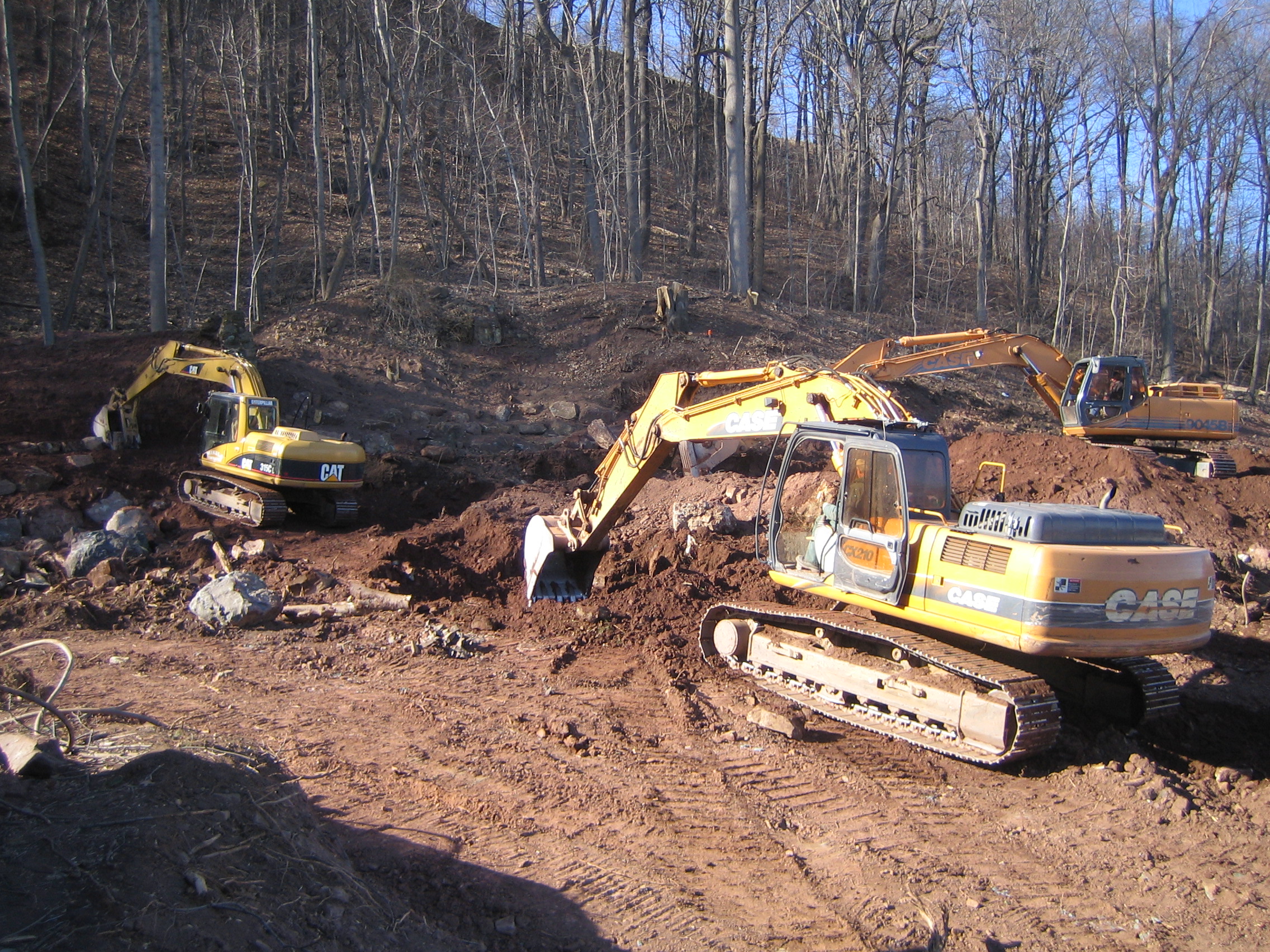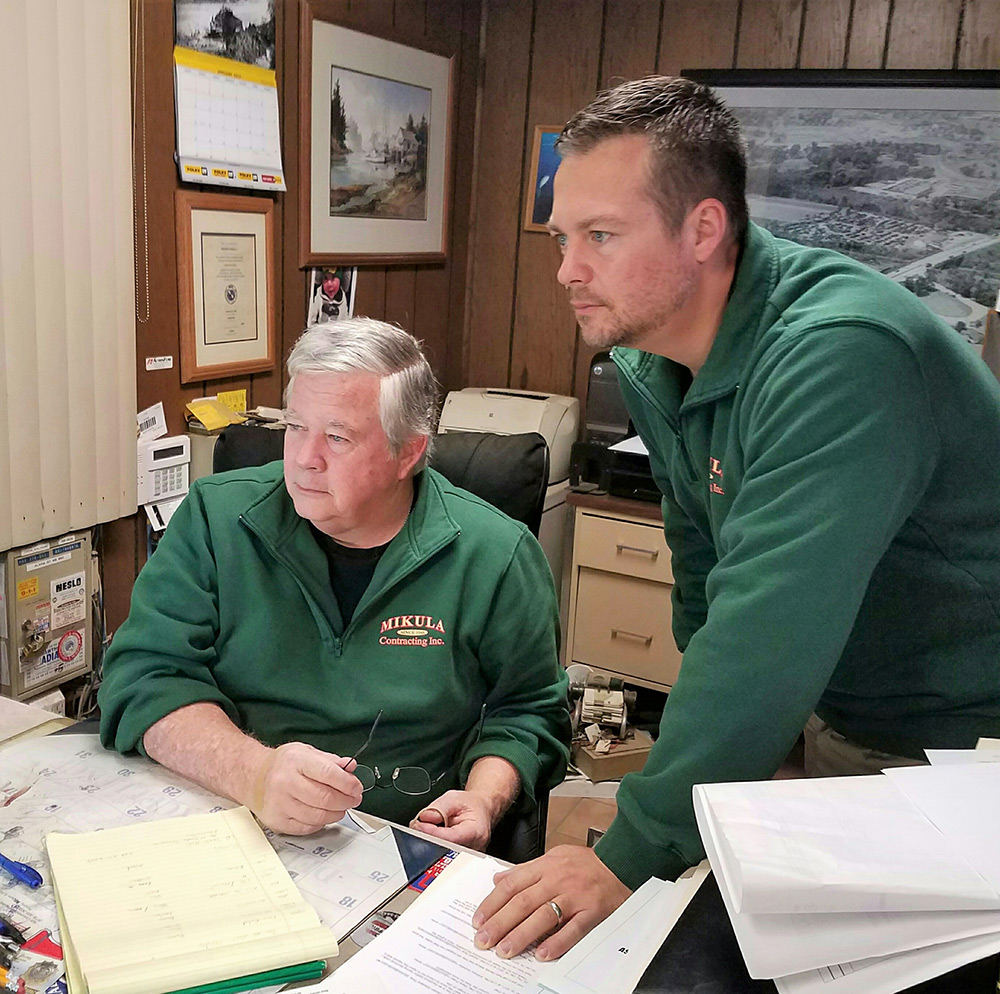Why You May Need a Seepage Pit
The term “septic system” refers to a plumbing system with many other parts, including seepage pits, leach lines, and more. Homeowners with septic systems often don’t realize that different parts of the plumbing system exist.
However, a plumber can explain the system and ensure everything is in working order to handle the plumbing waste from your property. If there are ever any issues with your septic tank or seepage pits, then the best thing you can do is call an expert plumber and an experienced excavation contractor for assistance.
What Is a Seepage Pit?
Seepage pits work to filter and collect gray and black water out of the septic tank. The pit is designed with anaerobic bacteria that feed on organic matter, then the pure water seeps through the stone and into the ground below.
Technically, a seepage pit is a well. It is lined with stones or porous materials that filter the water before it seeps into the ground. Seepage pits are an alternative option if a drain field won’t work in the area.
This method is a way to handle household waste without any toxic concerns in the surrounding area. You can discard the water coming from the septic tank while protecting the environment at the same time.
Five Reasons Why You May Need a Seepage Pit
Just because you have a septic tank doesn’t necessarily mean you also have a seepage pit. If you are wondering whether you need this feature, then it’s time to talk to a plumber and an excavation contractor about your needs. Here are a few reasons why you might consider seepage pits for your property.
1.) High Water Usage
If your household uses a lot of water, you need a safe place to discard the water. A drain field and septic system are great solutions for managing the used water. Instead of holding all the water in a tank, the treated wastewater can seep into the ground and return to the normal water and weather cycle.
2.) Limited Space
Because of the way seepage pits are designed, they provide an ideal solution when space constraints are a concern. They are designed using concrete rings or masonry blocks, leaving a smaller horizontal footprint than other septic system designs. So, seepage pits are perfect if you have limited space on your property.
Even if you have the space available, it’s possible that you might prefer to use the space for other things. For example, reducing the footprint of the septic system allows for more room for unique landscaping features, courtyards, swimming pools, driveways, and more.
3.) Environmental Regulations
When preparing to install or upgrade a septic system, always check local regulations to ensure everything is compliant. There might be specific guidelines that must be followed to protect the environment and surrounding soil.
Since seepage pits are environmentally friendly, they offer an effective solution for properties with strict environmental regulations. However, it’s important to maintain consistency with the maintenance and care to ensure the system always works optimally.
4.) High Water Table
A high water table limits some of the septic tank features that can be installed on your property. For example, the drain field might be limited by the high water, making it difficult for water coming from the house to move through the system. Or, water might actually flow from the drain field and back into the septic tank.
A good septic tank installer will evaluate the water table to determine the ideal layout for your system. Evaluating the conditions to determine how seepage pits, drain fields, and other features will perform is essential. Even if the water table is high, there are still solutions to manage the septic tank without complications.
5.) Cost Considerations
The overall cost of installing a septic system depends on various factors, including the size of the tank, materials, type of tank, and the system's complexity. Even though it might increase the cost to install additional features (such as seepage pits and drain fields), ensuring a reliable and effective system is worth the expense.
Remember that investing in a well-designed system will give you the long-lasting results you need. An efficient plumbing system protects your home and allows you to use all the modern plumbing features you need. Seepage pits can last for decades when properly designed and cared for properly. A well-designed seepage pit with quality materials can last 50 years or more.
Mikula Contracting Can Help Install a Seepage Pit for You
Do you need installation support for septic tanks, seepage pits, and more? Call the experts for help. At Mikula Contracting, we offer full-service solutions, including excavation and installation. Our team has an excellent reputation in the area, and we can help with both commercial drainage and residential drainage. Contact us today to schedule a consultation and learn more about available services.
The Importance of Stormwater Management
Not only does stormwater management protect the land, but it is often a necessary feature to reduce the risk of flooding and other associated issues. Do you need to have a stormwater system installed on your land or in your neighborhood? Even if there aren’t streams and rivers nearby, the land layout might require special considerations for stormwater runoff.
The key is to plan ahead so that stormwater management can be integrated into your construction and landscaping plans. A bit of planning and preparation right now goes a long way to avoid flooding in the future.
What Is Stormwater Management?
Stormwater management is the system that controls the water when a storm rolls through the area. The runoff usually comes from various impervious surfaces such as rooftops, driveways, and parking lots – anywhere the water can’t seep into the ground.
For example, rural or open-land areas allow stormwater to move through easily. Pastures and wooded areas provide a place for the water to sink into the ground. But in developed properties, there isn’t as much ground space for the water to soak into the soil.
Many property owners don’t realize the importance of stormwater management until an emergency situation occurs. Everything seems to be fine until a lot of water comes in a big rainstorm… and that water needs to have a place to go. Proper stormwater management systems can be designed with storm drains and other features that move the water away from your home and into the ideal disposal areas.
Four Reasons Why Stormwater Management Is So Important
Why do stormwater management systems matter? Here are just a few reasons why it’s essential to include a stormwater drainage system on your property.
1. Reduces Flooding and Erosion
Water can cause quite a bit of damage, especially when moving through unmanaged land. When a lot of precipitation falls, it can cause erosion in the dirt and flooding in areas where the water can’t soak into the ground.
Not only is erosion an inconvenience, but it can lead to damage if there is too much water. The soil must stay in place to protect your foundation and landscaping features. When huge amounts of water move through uncontrolled, it can be expensive because you will have a lot of repair work. Stormwater management is an effective solution to prevent these issues.
2. Decreases Water Pollution
Have you considered how polluted stormwater can be when moving through parking lots and other contaminated areas? If there are oil drips or chemical spills from the vehicles, it can affect the water quality.
A sanitary sewer system overflow is one feature that might be part of your stormwater management. Once the water moves into the drainage systems, these solutions offer benefits for removing pollutants and purifying the water.
3. Remain Compliant with Environmental Regulations
Depending on where you live, there are likely regulations for stormwater management. Because unmanaged water can be a threat and danger, many areas have specific rules to prevent these issues. A good stormwater system can improve water quality overall.
Check with your city and county about required water management practices. Then, talk to your excavation contractor to ensure your system is compliant. Not only do you need to look at how the water will move away from your home, but you also need to evaluate how the sewer systems will be integrated with the stormwater management.
4. Prevents Overflow of Storm Drains
If storm drains overflow because there is too much water, it can backflow into streets, lawns, driveways, and more. This overflow can damage properties, roadways, even the municipal infrastructure and make it difficult to pass through the areas. For example, if sidewalks and driveways are covered with water, it will interfere with traffic and pedestrians.
A stormwater management system moves the water in the ideal direction, eventually flowing into streams, pipes, and other features designed to hold the moving water. Not only do these systems work for rainwater, but they also need to be in place for catching the water from melted snow. The truth is that stormwater management is necessary throughout the year, even with the changing weather conditions.
Mikula Contracting Can Help with Your Stormwater Management Needs in New Jersey
Do you need help with your stormwater management and drainage system? Whether you are starting new construction or have an existing system that needs repairs or upgrades, we are here to help!
At Mikula Contracting, we offer full-service solutions for your projects. We provide commercial drainage, residential drainage, and more. Over the years, our team has built a solid reputation as one of the most trusted providers in the industry. Reach out at your convenience to learn more about available services. You are invited to contact us at any time to schedule a free consultation.
The Environmental Risks of Abandoned Oil Tanks
In the past, oil tanks were a common source of fuel to heat residential homes. Now, modern construction typically outfits properties with utility hookups that use fuel oil through the grid instead. But many properties are still out there with old, abandoned oil tanks. When these tanks are no longer in use, it’s essential to prioritize oil tank removal.
Regardless of whether an oil tank is abandoned or still in use, a buried tank can be potentially hazardous. These old, buried oil tanks can cause many environmental issues. If something goes wrong, you are responsible for cleaning the soil and mitigating the environmental damage.
Is an Abandoned Oil Tank Dangerous?
Some of the environmental issues from oil tanks are visible, while others won’t readily be noticed. As you learn more about these dangerous factors due to oil contamination, it’s easy to see why oil tank removal is an important investment for your real estate property.
When an oil tank leaks, the soil around the abandoned tank is hazardous. An average cleanup can run around $8,000, but depending on the circumstances these costs can be upwards of $100,000 or more because of the work required to clean up the hazardous spill. So, as a homeowner, it’s to know whether you have an oil tank in the yard, as well as the condition of the tank. A proactive approach is to invest in oil tank removal services so you don’t have a more expensive cleanup on your hands down the road.
Four Environmental Risks of Abandoned Oil Tanks
Many risks can occur if an oil tank is not properly decommissioned. These environmental risks affect you and your family, and the issues can seep into the soil and impact others in the community. Oil tank removal can help you avoid these common environmental risks of abandoned oil tanks.
Here are some of the ways an old oil tank could be causing hazardous issues in your yard.
1.) Contaminated Drinking Water
The first health hazard to consider is the way the tank is affecting the drinking water underneath. This issue is especially applicable to homeowners who use well water in their homes. Most oil tanks were installed before regulations were put into place, which means it’s possible that the tank was installed too close to the well.
Once the tank begins to leak, it can affect both soil and groundwater. These contamination issues are rarely easy to clean up, which is why problematic tanks must be removed as early as possible.
2.) Oil Leaching into the Soil
An oil tank leak will affect the soil around the tank. Initially, it’s just the nearby soil, but the oil can continue to move and contaminate other areas. If you have an underground heating oil tank, testing is important to determine if soil contamination has occurred. This information will help you know the extent of the problem that needs to be remedied.
Additionally, it’s important to consider where the oil tank is located. Because the location of the tank will influence the steps that must be followed for soil remediation. Not only do you need to pay for oil tank removal, but the soil that has been affected also needs to be cleaned.
3.) Danger to Wildlife and Plant Life
Another problem with groundwater contamination is that the hazardous materials from the oil tank can cause issues for wildlife and plant life. For example, you might notice that plants and trees in the area are starting to die. Wildlife could be drinking contaminated water or even eating plants that have been contaminated.
Anytime you purchase a property, pay attention to the plants and wildlife in the area because these factors can indicate if there are hazardous conditions. Also, never buy a property without completing soil testing. If you skip the soil testing and later find a problem that requires oil tank removal and soil cleanup, you will hold 100% of the responsibility for these costs.
4.) Leaks Into Your Basement
Even though most environmental concerns are related to underground tanks, in-home tanks can also cause problems because of leaking oil. There will be oil on the floor, and the vapor can move throughout your house. Leaking oil inside is a fire hazard for your family. Also, these basement leaks can eventually contaminate the soil and groundwater near the home's foundation.
One type of leak into your basement you may experience is a vapor leak. Vapor leaks can be a serious health threat, which is why it’s essential to invest in oil tank removal without delay. If there is an oil leak in or near your home, then it could result in your family breathing this vapor on an ongoing basis, which can have a negative impact on your health. When testing for oil vapor, also ask about testing for natural gas and other related issues.
Consult Mikula Contracting for Oil Tank Removal Services in New Jersey
While simply having an underground oil tank does not mean something will go wrong, it is always a possibility. If you have an oil tank that is not in use, having Mikula Contracting do a tank scan and provide a quote for removal is a good start at preventing the possibility of an issue with the tank in the future.
Reach out to our team for more information about available services.
Construction Sitework Best Practices
Before a site can be developed and construction can begin, construction sitework must be done as part of the preliminary part of the building plan. This process includes multiple preventive and precautionary methods that aren’t part of the structure or construction process but help to prepare the area for the upcoming work.
What Is Construction Sitework?
Construction sitework involves multiple steps to not only ensure construction site safety but also improve the overall outcome of the building project. Investing in good site work means that you are starting with the most important steps first.
Common aspects of site work include clearing debris off the site (including brush and trees), grading the soil, controlling erosion and sediment, excavating the site, installing septic tanks, putting in utilities, and more.
Ultimately, the goal of construction sitework is to set the stage for all of the construction activities that are to come. This process improves the building process and reduces the risk of potential issues later on.
Major Components of Sitework
When starting a construction project, talk to an experienced site work contractor to learn more about the best practices and recommendations for the job site. Each project is unique, which is why there isn’t a one-size-fits-all solution for site work preparation.
Here is an overview of some of the most common practices for construction sitework.
Land Clearing
First, anything that will get in the way of construction needs to be cleared. This process often includes removing vegetation and trees, as well as any other debris that is present on the property. Removing these items makes room for the new development that is coming.
Not only will clearing and grubbing make it easier to access the construction site, but it also reduces the risk of injury and problems later on. Usually, specific regulatory and environmental considerations need to be addressed, affecting how the debris is removed and how everything is disposed of.
Inspecting Site for Hazards
A thorough inspection must always happen before work commences. The goal is to identify anything that needs to be protected, such as water or utility lines. At the same time, this inspection can be helpful for managing potential hazards that can affect the construction process.
Shoring and Erosion Control
There is always a risk of collapse and weathering on the job site, especially if the soil isn’t stable. One aspect of construction sitework is to control the ground stability by carefully choosing the equipment, materials, and safety protocols that will be followed to protect the integrity of the site.
When determining the ideal shoring and erosion control, local environmental factors need to be considered, such as wind, rainfall, and any other weather conditions that affect the area. Additionally, it’s essential to protect natural resources and waterways in the vicinity.
Installing Guardrails, Fencing, and Ladders
One element of safety is to use the right equipment that will support workers in moving around with minimal risk of injury. The installation of ladders, guardrails, and fencing is essential, helping to reduce the risk of falling and injury on the job.
Not only does injury result in serious concerns for the affected team members, but injury can also have a negative impact on the risk of project delays. So, installing these protective elements is a win-win to protect individuals and help the team stay on track with the desired timeline.
Additionally, it’s important to note that proper PPE (Personal Protective Equipment) is required. This includes things such as high visibility vests or shirts, hard hats, respirators, safety glasses, and so on depending on what is needed for the site to ensure property safety measures are met.
Using Appropriate Tools and Equipment
Various types of tools and equipment can be used to ensure the successful outcome of the project. When a contractor invests in the right tools, it makes a difference in the outcome of construction sitework. At the same time, these tools and equipment matter to the safety of everyone on site.
As you are evaluating contractors in the construction industry who offer the sitework services you need, make sure to take time to ask questions about available services. In addition to learning more about their processes, you also need information about the tools and equipment they will be using.
Subgrade Shoring
These steps for construction sitework prevent issues relating to the way the ground shifts or caves. The goal is to keep the soil stable below the topsoil, which reduces the risk of soil sifting or site caving. Subgrade shoring is a critical part of the preparation for construction in order to avoid structural damage (such as foundation cracking) in the future.
The most common approach is to use a reclaiming or stabilization agent, which is blended with lime or cement and added to the soil. The specific products are selected based on soil type because the amount and type of additives change depending on soil testing and quality.
Preparing Drainage and Water Systems
Finally, it’s essential to manage drainage and water systems. These systems not only bring safe water to the building but also have methods for clearing stormwater from the site. Regardless of the size of the construction project (residential or commercial), every building needs potable water and a way to pump the wastewater out.
Drainage and water systems are put in place in the beginning as part of the construction sitework. Then the site will be ready for construction. At Mikula Contracting, we use multiple pumps and generators as needed to ensure drainage and water systems are managed properly.
Safety Is Always the Most Important Goal
The most important factor on every job site is protecting the safety of workers and anyone else who sets foot on the site. Hiring an experienced contractor for construction sitework ensures optimal results by protecting the team.
Consult Mikula Contracting for Your Construction Sitework Needs
Do you need more information about construction sitework services in New Jersey? Reach out to the experts: Mikula Contracting is here to help with commercial excavation, residential excavation, site work, and more.
The Economic and Environmental Impacts of Poor Drainage
Poor drainage can happen in a commercial or residential setting. Although it may not seem like a problem at first, the economic and environmental impacts of poor commercial drainage and residential drainage can be enormous in the long term.
The impact of less-than-desirable water drainage can affect all of us, as it allows water to damage the foundations of our homes and buildings, destroy our roads and other public areas, and even affect our health in several ways. Let's discover more about the impacts of poor drainage and why we all need to pay attention.
Flooding
We've all seen TV news coverage of horrible flooding, especially during the rainy season. Flooding can cause tragic loss of life as well as property. If you've ever had a home flood, you know how devastating it can be and how much money it can cost to repair the damage.
Think about the crops and farms damaged for a whole season or more when flooding occurs. It's sad to see, especially when in many cases simple commercial drainage or residential drainage solutions for surface water and subsurface water could have made the difference in preventing thousands of dollars of damage. Additionally, think of the irreplaceable effects of flood damage such as loss of property, memories at that property, or sentimental items within the property like photo albums.
Water damage continues to be the number one repair expense in the country. This is due to many factors, including poor landscaping and ineffective drainage systems. In addition, homeowners and building owners contribute, ignoring the fact that regular maintenance must be done to their drainage systems as well as other areas of their property on a regular basis.
Installing drainage methods such as a French drain, a catch basin, and trenches can help. Also, repairing soil erosion or incorrect land grades can help take flooding waters and redirect them away from your property, solving recurring flooding problems.
Erosion
An issue that is commonly seen with poor drainage is erosion. When water is allowed to run freely, it will collect things like soil and other debris along the way. This erosion can affect the look of your landscaping by carrying soil to other places as well as taking the nutrients from plants and trees that are needed for healthy growth. It can also cause structures, roads, and sidewalks to collapse or sink.
There are effective drainage systems that help with water management as well as erosion control systems that can fix these issues or at least minimize them.
Pests
If you have standing water in areas of your property, you could have a health hazard on your hands for you and other living creatures around you. Stagnant water tends to attract mosquitoes and other pests, and as they breed, this water becomes very unhealthy and even carries diseases. As insects and wildlife come to drink from that standing water, they can become very sick.
Mold can also become a major concern in places like basements or other damp areas. This is another reason why adequate commercial and residential drainage is a must. You don’t want standing water on your property at all.
Unsanitary Conditions
Unsanitary conditions are one of the scariest things that can happen from poor drainage systems or the lack of drainage systems altogether. As conditions become unsanitary and stagnant water is present, all kinds of waterborne diseases and illnesses can come forward.
We’ve seen or heard examples of these unsanitary conditions in countries all over the world. Drainage systems put in place by charities or other volunteers in these areas continue to help residents stay healthy and strong, keeping unsanitary conditions at bay.
Foundation Damage
Some drainage systems tend to direct water out of downspouts that are close to the foundation of your home or building. This kind of continued exposure to water can cause damage to the foundation. Especially during the cold months of the year, the water can enter cracks in the foundation and then freeze and expand, making the cracks worse.
Keeping your gutters and roof clean and clear of debris, as well as extending downspouts away from your foundation, can help ease these issues. Always consider your foundation and its longevity when brainstorming drainage solutions.
Consult Mikula Contracting to Solve Your Residential and Commercial Drainage Issues
Mikula Contracting is ready to help with any residential drainage or commercial drainage problems you may face. Whatever structure you are trying to protect, we can help you make a better plan for effective drainage.
If you have begun to see soil erosion, standing water, foundation cracks, or more, contact Mikula Contracting today. Our team of experts will advise you on the best commercial drainage and residential drainage options available to you and your property. Our goal is to repair or tweak existing drainage systems if they are the best course of action, minimizing your financial hit. Together we can solve any drainage issues you have.
How to Navigate Complicated Demolition Projects in Densely-Populated Areas
Demolition projects in busy cities or neighborhoods come with their own unique set of challenges. The presence of neighboring structures, heavy traffic, pedestrian safety concerns, and regulatory requirements require a careful and strategic approach to ensure a successful demolition process.
The good news is that you can safely conduct a demolition with careful planning and consideration. If you require professional demolition services, Mikula Contracting is here to assist you with our expertise and experience in building demolition project planning.
Understanding the Unique Challenges of Demolition in Dense Areas
When you are ready to embark on a demolition project with nearby buildings and community residents, you need to have a plan. Consider damage to surrounding property, passers-by, and even noise advisories.
Additionally, the presence of hazardous materials, such as asbestos, in older structures necessitates proper identification, handling, and disposal to ensure the safety of workers and the community. How can you conduct building demolition project planning to achieve a successful demolition? Consult the experts.
Navigating Regulatory Requirements and Permitting Processes
Get very familiar with the regulations and permits required for demolition in the area. Local authorities may have specific guidelines and regulations in place to protect public safety and minimize disruption to the surrounding community.
What rules do you have to follow? What permits do you have to obtain? Your building demolition project planning should include waiting periods for permits so that your project does not have to unexpectedly come to a halt.
It is crucial to work closely with the relevant agencies and obtain the necessary permits and approvals before commencing any demolition activities. Your demolition contractor will need to obtain the proper permits, have the right insurance, and follow all protocols the local municipality has established. This is why it's critical to choose an experienced New Jersey demolition contractor such as Mikula Contracting who knows what is required for a project to run smoothly.
Community Outreach and Communication During the Demolition Project
Maintaining open lines of communication with the community is essential during a demolition project in a densely-populated area. Reach out to the community to present your plan, offer a pathway for feedback, and give them ample time to plan for closed sidewalks or even streets.
Proactive community outreach helps to establish a positive working relationship with the local community. Continual updates about your building demolition project planning through newsletters, public meetings, and city websites can solidify respectful communication and help the community feel comfortable with your demolition plans.
Pushback from the community could delay your project, so proactive communication is always the best idea especially since your contractor must follow the guidelines put forth by the municipality.
Best Practices for Noise and Dust Control in Dense Urban Areas
The biggest complaints from the community during a demolition project are regarding noise and dust. Have you ever been at home with nearby construction and can hardly hear yourself speak? Empathize with nearby residents and businesses by taking extra courtesies.
You can operate heavy equipment during specific times of the day so that you do not disrupt sleep or evening time at home. These aspects of building demolition project planning will help minimize disturbances to nearby residents and businesses.
In addition, keep dust at bay with a dust-control plan, such as wetting down debris and using protective covers. This ensures that dust levels are kept to a minimum, ensuring cleaner air and less disruption to surrounding community members.
Managing Traffic and Pedestrian Safety During Demolition Projects in Busy Areas
Nearby roads and sidewalks may be affected by your demolition project. What can you do to notify the city about possible disruptions to their regular routes? Temporary road closures, traffic diversions, and clearly marked pedestrian pathways are essential to maintain the safety of the public and construction personnel.
Post signs and warnings for upcoming closures so that people have time to plan around the detours. Additionally, many municipalities require demolition contractors to have a traffic cop on site when road closures are required to complete the job.
Lastly, pedestrian safety is also paramount. At Mikula Contracting, we will block off sidewalks and areas using a safety fence which is a common way we maintain safety during the demolition projects that we complete.
Mikula Contracting: Your Trusted Partner in Building Demolition Project Planning
Mikula Contracting is your trusted partner for demolition projects in densely-populated areas. We specialize in building demolition project planning, ensuring a seamless and safe process from start to finish.
Our team is ready to help you with your demolition project while making sure the safety and comfort of the surrounding businesses and residents are top priorities. Calm the nerves of local authorities and residents by choosing to work with Mikula Contracting for building demolition project planning.
What Are Some Potential Environmental Hazards of Excavation Projects?
A variety of projects require excavation in New Jersey, including swimming pool installation, foundation digging, surface leveling, and landscaping services. Learn about potential hazards associated with excavation in NJ so that you can plan for a safe and proactive approach.
When you are aware of some common environmental hazards of excavation, you will have the knowledge to avoid these dangers. For professional excavation services in New Jersey, look no further than Mikula Contracting. With our expertise and commitment to safety, you can carefully execute your plan for your New Jersey excavation project.
Here are some environmental hazards of excavation to keep in mind.
Soil Erosion
Soil erosion occurs during excavation when water runoff, rain, or wind erodes the soil and turns once stable areas into dangerous areas. For example, trenches can collapse, fertile topsoil can flush away, and injuries can happen.
During excavation, plan for soil erosion control measures. This can include control blankets to protect the soil during a downpour, soil stabilizers, or packing down the soil to protect it from natural erosion. Protect the workers and increase safety on the job site by taking these soil erosion prevention steps.
Potential Underground Hazards
You don’t always know what you’re going to uncover during excavation. Finding contaminated or hazardous soil or even an underground oil tank is something all contractors should be prepared for. Be ready to test the soil when you notice a suspicious texture, smell, or structure that makes you suspicious of a chemical spill.
Water is commonly used during any excavation project and can spread the contaminants, further magnifying the environmental impact. The moment you find hazardous soil or contaminants, take remediation measures very seriously to avoid danger to nearby occupants and future residents of the property. When encountering soil contamination, be sure all workers wear personal protective equipment (PPE), enlist multiple instances of soil testing, and renew the soil with fertile, healthy backfill.
Trench Collapses or Cave-Ins
Excavation requires digging deep holes and trenches to build foundations or install pipes. Contractors work in the trenches, making them vulnerable to accidents if the trench collapses. Severe injuries or fatalities could be the result.
To prevent trench collapses, a comprehensive protective system must be implemented. This includes using trench boxes, shoring, or other protective structures to support trench walls and prevent cave-ins. Inspecting the trenches, evaluating the stability of the soil, and training contractors for safety protocols are essential to maintaining safe practices during excavation in New Jersey.
Dust or Other Airborne Particles
Excavation projects can generate dust and airborne particles, presenting environmental hazards as well as potential health risks for workers and nearby communities. When working with dry and fine-grained soil, the wind can whip it into the air, leading to workers and nearby passersby breathing in contaminants or hazardous substances. These airborne dust particles can lead to human health issues that should be avoided at all costs.
An excavation site should employ a dust control protocol to reduce the spread of dust into the air and to surrounding people. Many contractors spray the dry dirt with water to moisten it, making it less likely to become airborne during a strong gust of wind. A ventilator can be used to collect loose dust in the air. And workers can wear masks and PPE to protect themselves from inhaling hazardous substances.
By effectively managing dust and airborne particles, excavation projects can minimize environmental impacts and protect the health of workers and the surrounding community.
Water-Related Hazards
Any construction site can be a place of water accumulation due to storms, groundwater seepage, or nearby bodies of water. Water runoff can lead to erosion on the site, impacting the soil stability. Water can also carry pollutants into nearby water sources.
Standing water also attracts mosquitoes and other pests, making the work site uncomfortable and posing additional environmental and health risks. Mosquitoes not only bite but also spread disease. Rats and roaches make themselves at home, creating a germ-filled breeding ground for pests during construction.
Water management is essential for excavation. This may involve installing silt fences or sediment basins to control runoff and sedimentation. You can also install temporary drains or runoff paths that make the area safe for the duration of the excavation project. By effectively managing water-related hazards, excavation projects can minimize soil erosion, maintain water quality, and protect the surrounding ecosystem.
Hitting Underground Utilities
One hazard of excavation is the risk of fires. Especially if you are digging close to a gas line, you need to be extra careful to eliminate the risk of hitting a pipe underground. If a contractor is ready to dig without surveying the ground and calling in a markout, it is time to find a new excavation contractor.
Safeguard against these hazards by implementing proper safety protocols and adhering to Occupational Safety and Health Administration (OSHA) guidelines. This may involve using trench boxes to provide protective shielding, conducting thorough gas detection and monitoring, and establishing clear evacuation procedures in the event of a hazardous situation. Reduce the risk of fire by doing your due diligence and researching before a dig occurs.
In addition to hitting a gas line, other utility lines also pose a danger to the excavation site. Hitting a live electricity wire can lead to electrocution. Cutting into plumbing systems can lead to leak and damage that requires expensive repairs.
Every excavation contractor should mark the land with the exact location of underground utility lines to avoid any damage to existing networks. While mistakes can happen, when working with an experienced contractor you should have peace of mind that you have hired professionals that will avoid mistakes and mitigate issues if they arise.
Mikula Contracting Is Your New Jersey Excavation Solution
Mikula Contracting has the experience you need for a successful excavation project in NJ. Our dedication to safety, customer communication, and state-of-the-art equipment is evident in every project we complete.
We provide top-quality excavation services tailored to the unique needs of each customer. Our team at Mikula Contracting follows the most modern practices, adheres to regulatory requirements, and uses advanced techniques and equipment to ensure efficient excavation operations. Contact us today to find out how we can help.
4 Important Safety Considerations that Separate Trusted Excavation Contractors from the Rest
Excavation projects can be complicated, and the foremost concern is always safety. Our team at Mikula Contracting works every day to protect workers and follow guidelines set by the Occupational Safety and Health Administration (OSHA).
If you are contemplating DIY excavation, think about all the training required to ensure safety during such projects. Our team is OSHA-30 certified. We have completed the 40-Hour Hazwoper training. We have Tank Closure certification. We have toolbox talks weekly where we discuss possible hazards and what we can do to prevent them.
We are fully dedicated to learning and implementing essential safety practices– and it shows. In 2021 and 2022, we received the New Jersey Land Improvement Contractors of America Safety Award. Each time, we have been honored to represent a reputable name in the business that values safety above all else. Setting the industry standard for safety is paramount, and Mikula Contracting is happy to lead the cause.
Excavation comes with many certifications in order to ensure the safest site possible. In this article, we want to focus on four important excavation safety certifications that you should look for in every excavation contractor.
1. OSHA 30
OSHA 30 is an excavation safety certification focusing on safety guidelines specific to the construction industry. When the training is complete, many construction workers carry an official Department of Labor card, known as the OSHA 30 card. Some states even mandate that construction workers have a card showing their excavation safety certification.
The OSHA 30 course topics include the following:
- Fall Hazards: When working on excavation and trenching, you always risk falling in a deep trench that could seriously cause serious injury. Health Administration OSHA 30 details safety measures to protect against falling down holes, off roofs, or other common construction scenarios.
- Struck-By Hazards: Working with heavy objects during construction, you risk being hit by falling or moving objects. The excavation safety certification will always ensure you know what to look out for.
- Caught In-Between Hazards: A good percentage of construction accidents come from getting crushed or stuck between two heavy objects. What can you do to avoid such mishaps? Attending 30 hours of training for an excavation safety certification will teach you how to prevent major injuries from these kinds of hazards.
- Electrocution Hazards: OSHA 30 will guide you through the process of de-powering nearby electrical sources before starting construction.
With this certification, our employees are well-equipped to identify potential hazards and act as competent persons to ensure safety on the job site. You always want workers on your project with excavation safety certification like our team at Mikula Contracting.
2. 40-Hour Hazwoper
“Hazwoper” stands for Hazardous Waste Operations and Emergency Response, and OSHA provides this training program. As excavation contractors, we understand that hazardous materials may be encountered on job sites. This safety training equips our employees with the knowledge and skills to handle hazardous materials safely.
When this protective system is in place, the team can safely navigate the excavation of toxic soil from a property. Or if a chemical spill occurs, our team has excavation safety certification that allows us to enter the site and safely clean up the spill unscathed.
With the 40-Hour Hazwoper certification, we prioritize the well-being of our workers and ensure that potential hazards are avoided.
3. Tank Removal
When it comes to oil tank removal most towns require a permit to remove the tank. This is where your oil tank removal contractor such as Mikula Contracting comes into the picture. Our team will get any required permits for your tank removal so you don’t have to worry about it. From there, we remove your tank which entails a few different steps. First, we uncover the tank. We then have a company come to pump out the tank and scrub it clean. We then remove the tank from the ground completely. We are on-site for the scheduled inspection. If you pass inspection we will complete the project by backfilling the area. If you do not pass inspection it is typically because there was some soil contamination found from a leak in the tank. If that is the case you’ll need some soil testing done and possible remediation work, which is something Mikula Contracting can help with.
4. Experienced Excavation Equipment Operation
Powerful equipment is used for excavation projects, whether wrecking balls, excavators, or other heavy machinery. Therefore, each employee on the construction team should only be able to work once they have completed the necessary training courses to operate the heavy machinery.
Obtaining an excavation safety certification is crucial when operating a diverse range of excavation equipment. Whether you're involved in leveling substantial building structures, clearing the soil by moving large rocks or excavating through layers of limestone, it's essential to prioritize safety. The equipment used in such tasks should be approached with seriousness.
Work with Mikula Contracting to Ensure Safety During Your Next Project
At Mikula Contracting, we prioritize safety at every stage of the construction process. In addition to our certifications, we conduct weekly toolbox talks, which allow our team to discuss safety-related topics, address concerns, and reinforce best practices. Consistent communication and continuous education are vital for maintaining a safe work environment.
As highlighted before, our dedication to safety has been recognized by the New Jersey Land Improvement Contractors of America Safety Award. We are proud to be two-time recipients of this esteemed award. When we put safety first by prioritizing excavation safety certification, our safety record shines.
When you choose Mikula Contracting for your excavation needs, you can be confident that safety is our top priority. We continuously invest in the well-being and training of our team, ensuring that they are well-prepared to handle any safety challenges that may arise.
Work with Mikula Contracting to ensure safety during your next project. Contact us today to discuss your excavation requirements.
A Guide to Construction Site Work
Site work is the foundational preparation of an area for construction. Whether the tasks involve leveling out the land, excavating trees or rocks, or building drainage systems, your construction project needs a trustworthy plot of land.
Before the building even begins, construction site work is the initial step to ensure the project runs smoothly and safely. What do you know about construction site work? Let’s dive deeper into the topic to find out what you need before you start on your development project.
What Is Site Work in Construction?
Construction site work includes the necessary steps before construction begins. For example, suppose you identify the possibility of erosion, shifting, or caving. In that case, you have the responsibility to ensure the stabilization of the soil and that it is ready to withhold a residential or commercial building.
Do you have access to clean water on the site? Construction site work will set up clean water access to aid in the construction process. Water is needed for dust suppression and mixing concrete. In addition, once the building is complete, a water source is essential. These are just some examples of construction site work.
Why Is Site Work Important?
What makes the site work important? If you were to skip construction site work on your next construction project, you could be in for a failed project. At the very least, without proper site work, you may face significant challenges and delays. Whether your project is being worked on a new or existing property, having a thorough understanding of the site and performing all the necessary preparatory steps will set you up for success.
If the soil is not cleared, leveled, and ready with drains and erosion control, then the soil could sink and lead to a building toppling over amid heavy rain or flooding. Is the land stable enough for the construction of a building? Construction site work will ensure your building is built on solid ground.
Clearing and Grubbing
One essential step of construction site work is clearing and grubbing. This is the process of removing all trees, bushes, and stumps from the construction area. Grubbing is a term used to describe removing roots and vegetation that would cause uneven ground.
Once the clearing and grubbing step is complete, the construction site should be a clean slate, free of any branches, roots, or obstacles.
Erosion Control and Shoring
The water systems used during construction could alter the construction site. In addition, construction site work takes into account rain and other elements that could cause erosion once the building is constructed.
Erosion control is necessary to reinforce the land. This can be implemented by building retaining walls or laying erosion control blankets. If the building is on a slope, slope stabilization methods are implemented to make sure the construction project is level and secure.
Shoring systems can be installed temporarily to protect construction workers during the project. It involves the installation of temporary support structures to prevent soil collapse and ensure worker safety during excavation or other activities. In addition, shoring systems provide structural reinforcement and stability, ensuring workers are not at risk of cave-ins or other related hazards.
Subgrade Stabilization
Subgrade stabilization refers to the state of the ground that will be underneath the building. Several measures are taken to ensure the subgrade is stable. This can include soil compaction, chemical treatments, or blending the cement with a reclaiming agent to ensure there will be no cracks or shifting possible once the building is complete.
Soil testing is part of the subgrade stabilization process. The moisture level of the soil will give the team an idea of what to do next in the construction site work process.
Excavation
Excavation removes large rocks from the construction site. If you have to dig for a foundation, excavation helps dig out limestone and other rocks that are in the way. Large machinery is used to safely and skillfully clear the land of significant obstructions.
Excavation is also the process of digging trenches to install pipes or gas lines for easy access to the building. All of this is part of the construction site work process.
Water Systems and Drainage
Drainage systems are essential to prevent water accumulation. During and after the construction process, water should not pool on the site. If water surrounds the construction site, it could mean flooding of the building once it is built, as well as erosion risks.
Construction site work will always include installing drainage systems to keep water moving through the site rather than stopping to break down the soil and cause further problems.
Additionally, water and drainage systems help to prevent seepage, which is the slow movement of water through small openings and spaces in the surface of unsaturated soil into or out of a body of surface or subsurface water. Without proper structures in place, seepage can lead to serious structural issues, such as foundation sinking or settlement, and ultimately, its collapse altogether.
Contact Mikula Contracting for Your Construction Site Work Needs
Construction site work is pivotal in starting a successful construction project, whether your project is on a new or existing property. Each step is crucial in creating a safe and efficient construction environment, from stabilizing the soil to implementing erosion control measures.
When it comes to construction site work, it is essential to rely on experienced and professional contractors. Mikula Contracting is a trusted name in the industry for excavation, drainage systems, and other construction site work. Contact us to learn more about what we can do for you.
June Is Safety Month – Learn About Mikula Contracting's Commitment to Safety
June is Safety Month, a time to raise awareness about the importance of safety measures in various industries. At Mikula Contracting, we take safety seriously and prioritize the well-being of our employees above all else by taking special measures to avoid injuries and fatalities.
With a focus on excavation safety and demolition safety, we ensure that our team is equipped with the knowledge, tools, and protective gear necessary to mitigate potential hazards and maintain a safe work environment.
The Importance of Safety Measures
In any industry, safety measures are of utmost importance to protect workers and reassure clients that the work is being performed in the most conscientious way possible. When it comes to excavation work, specific hazards need to be addressed.
Trench collapses, for instance, pose a significant risk. Serious injuries could occur if employees are not trained to support the trench sides or put up barriers to ensure no one falls into the trench.
Demolition safety is also paramount. No matter which demolition method you use, heavy items falling from a controlled explosion or an excavator moving heavy materials back and forth could lead to injuries to individuals who are in the wrong place at the wrong time. In these cases, most accidents can be avoided.
At Mikula Contracting, we take extensive precautions to protect our workers from such hazards. Our team of professionals ensures that appropriate protective measures are in place.
Employee Requirements
Training for our employees is essential to avoid demolition or excavation hazards and ensure that our team members are properly protected. We can create a safer working environment by equipping our employees with the necessary knowledge and protective gear.
If you are considering a construction company that does not prioritize excavation or demolition safety, it is time to move on to a company that takes safety very seriously. Ask tough questions to see who is ready with a safety plan before moving forward with a company that does not require employee safety training.
Pre-Job Safety Considerations
Before any excavation work begins, pre-job safety considerations are carefully considered and entered into the planning process. Trenching and excavation safety plans are unique to each project and should be performed by a competent person. The excavation-competent person is also designated to call out any safety concerns on-site, classify soil, clear sites authoritatively, and perform inspections.
Factors like the slope or bench configuration and soil type are carefully evaluated to determine the appropriate safety measures. Is there a risk of collapse? Has the soil been tested to ensure it is free of toxic substances? All of these things should be assessed before moving forward on the project.
The plan may include protective measures, such as shoring, shielding, or sloping to prevent cave-ins. Access and egress points are adequately protected, allowing safe entry and exit from trenches. Excavation hazards are thoroughly evaluated, and our team receives regular training on recognizing and mitigating these hazards.
For a demolition safety plan, the employees may plan for fire safety, first aid services, and locating any nearby utilities. A demolition-competent person should always be on-site to inspect the demolition site and identify any safety concerns.
Conducting thorough pre-job safety assessments ensures that our employees are well-prepared and equipped to handle their challenges. Then nothing catches us by surprise when a hazard does arise.
Jobs Where Safety Issues May Cause Concern
Specific jobs may pose particular safety concerns. For example, projects involving steep slopes or benches require additional precautions to prevent accidents and ensure worker safety.
Similarly, the soil type can influence the stability of trenches and the potential for cave-ins.
Demolition safety includes preparing for falling heavy objects, toxic materials hidden inside the building, or danger from explosions used in demolition.
What Kind of Safety Issues Can You Expect?
Excavation and demolition safety comes with identifying potential hazards that could arise during a project, such as:
- Cave-ins
- Falling objects
- Hazardous soil or materials (lead or asbestos)
- Utility-related accidents
- Demolition-related accidents
At Mikula Contracting, we proactively address these concerns through thorough safety training. Our team is taught to identify potential hazards and take immediate action to mitigate risks, ensuring a safer work environment for everyone involved.
How We Handle Safety Issues
At Mikula Contracting, we adhere to the guidelines and regulations set by the Occupational Safety and Health Administration (OSHA). We regularly review and update our safety protocols to meet or exceed industry standards.
Our commitment to safety includes conducting thorough inspections and providing continuous training for our employees. A proactive approach to excavation and demolition safety is key to preventing accidents and promoting a culture of safety and responsibility.
Protective Gear We Require
To ensure the safety of our employees, we require the use of appropriate protective gear. This includes personal protective equipment (PPE) such as hard hats, high-visibility vests, safety glasses, gloves, and steel-toed boots.
We also offer hearing and respiratory protection and harnesses for those working from great heights during demolition. If an employee ever feels unsafe, we encourage open dialogue to brainstorm and come up with a solution before continuing the project.
Mikula Contracting Considers Safety Above All Else
At Mikula Contracting, safety is a top priority. We are committed to providing a safe working environment for our employees. By prioritizing excavation safety and demolition safety, adhering to regulations, and continuously improving our safety practices, we strive to set a high standard for the industry.
Working for an excavation company does not have to be a risky job. When employees choose to work with a company that values their safety and adheres to strict safety protocols, they can feel confident going to work daily. In addition, clients feel more comfortable when employees prioritize safety on the job.
June is safety month, and it serves as a reminder of the importance of implementing safety measures in all industries. Trust Mikula Contracting for your excavation or demolition needs, knowing that we put safety above all else.
